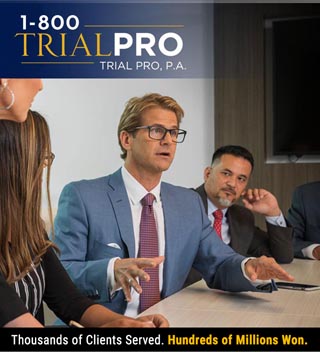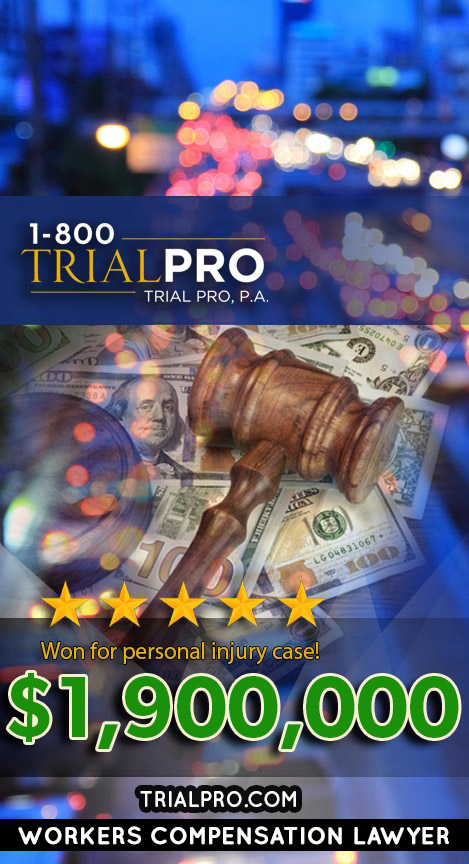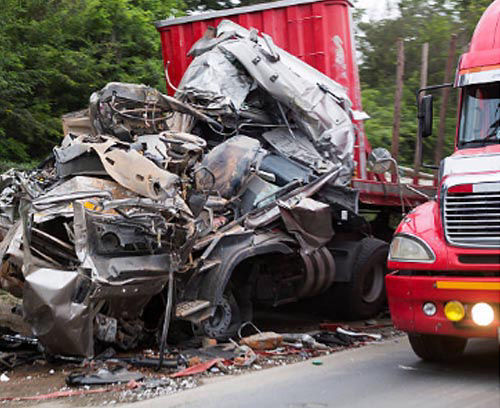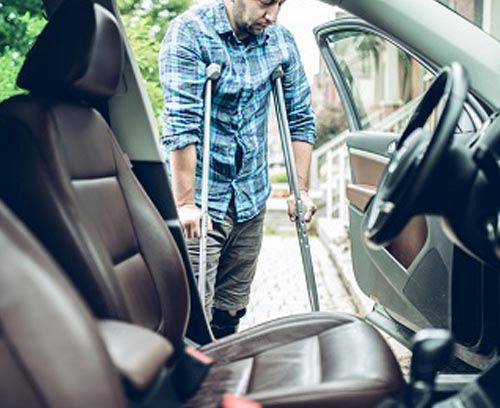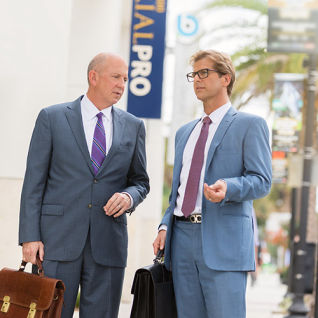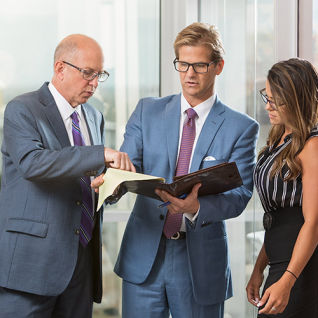After experiencing an accident in Orlando, the last thing you want is to have an attorney at hand that doesn't know how to represent you adequately. You want a reputable Orlando law firm that will fearlessly fight to acquire maximum compensation on your behalf. That is precisely what Trial Pro, P.A. does. Our Orlando lawyers hold a strong reputation for winning cases, and we do everything in our power to deliver the results you're expecting.

Workers' compensation laws are designed to support and protect injured employees while performing their duties. These are complex laws that require expert knowledge and experience to navigate. This is where the worker's compensation attorneys at Trial Pro, P.A. come in. With an impressive track record of success, our firm is the go-to choice for employees and their families in Longwood and surrounding cities and counties.
At Trial Pro, P.A., we understand that workplace injuries can devastate your life, both physically and financially. Injuries can result in costly medical bills, lost wages, and permanent disability. Our team of skilled worker's compensation lawyers is here to help you get the compensation you deserve and hold your employer and their insurance company accountable.
If you have been injured on the job, it is necessary to seek legal representation immediately. The legal process can be complex, and employers and their insurance companies often have legal teams fighting against your claim. The lawyers at Trial Pro, P.A. have the expertise and experience to fight against these tactics and protect your rights.
We serve clients in Longwood and the surrounding cities and counties, including but not limited to Winter Springs, Casselberry, Altamonte Springs, Maitland, and Orange County. Our focus is on providing personalized attention to each client to get you the highest compensation in your case.
When you hire Trial Pro, P.A., you can rest assured you get a team of highly skilled and aggressive lawyers on your side. Our attorneys are experienced in handling all types of worker's compensation cases, including construction accidents, slip, and fall accidents, repetitive stress injuries, etc.
Our lawyers are passionate about fighting for our client's rights, and we take a comprehensive approach to every case. We will investigate your case thoroughly, gather all evidence needed to support your claim and negotiate with insurance companies on your behalf. We are prepared to take your case to trial if a fair settlement cannot be reached.
At Trial Pro, P.A., we understand that the legal process can be overwhelming and confusing. We are committed to giving our clients the support, guidance, and resources they need to make informed decisions and feel confident throughout the legal proceedings.
Do not wait to seek legal representation if you have been injured on the job. Contact the skilled worker's compensation lawyers at Trial Pro, P.A. today. We offer a free consultation to discuss the specifics of your case and determine the best course of action for your particular situation. Don't let insurance companies and employers take advantage of you. Let us fight for you and get you the compensation you deserve.


In Florida, workers' compensation covers a wide range of work-related injuries, from minor cuts and bruises to more serious injuries such as broken bones, torn ligaments, and even permanent disabilities. Workers' comp benefits can include medical treatment, wage replacement, and long-term disability benefits, depending on the nature and severity of the injury.
If you have been injured on the job in or around Longwood, Florida, you may be eligible for workers' compensation benefits. This includes workers in nearby cities such as Altamonte Springs, Apopka, Casselberry, Lake Mary, Maitland, Oviedo, Sanford, and Winter Springs.
To obtain workers' compensation benefits, you must report the injury to your employer as soon as possible and seek medical treatment from an approved provider. You should also consult with an experienced workers' compensation attorney who can help you understand your rights and guide you through the complex claims process.
At Trial Pro, P.A., we are dedicated to protecting the rights of injured workers and helping them recover the benefits they deserve. If you or a loved one has been injured on the job in Longwood or the surrounding areas, contact us today to schedule a free consultation with one of our skilled attorneys. We will work tirelessly to help you obtain the compensation you need and deserve to move forward after a work-related injury.


Trial Pro P.A. is proud to advocate for workers compensation victims all over the state of Florida, including our office in Longwood. Our dedicated experienced personal injury attorneys handle a range of legal matters, from employment disputes to auto accidents claims. We can use our knowledge and legal skills to help you not only achieve a favorable outcome, but relieve the legal burden from your shoulders as well. Our entire team understands how challenging and confusing litigation can be, which is why we are here for you through every step of the process. Serving all areas of Florida including Orlando, Gandy, Lake Monroe, Manatee County, Orlovista, Astor and more!
Frequently Asked Questions About Workers Compensation in Longwood, Florida
- Can you work while on workers compensation?
- Can you sue workers compensation for pain and suffering?
- Can you be fired for being injured on the job?
- Can The Internal Revenue Service take a workers compensation settlement?
- Can I get unemployment if I get hurt at work?
- Can I sue my employer for emotional distress?
- Do workers comp Insurance Companies Pay For Lost Wages?
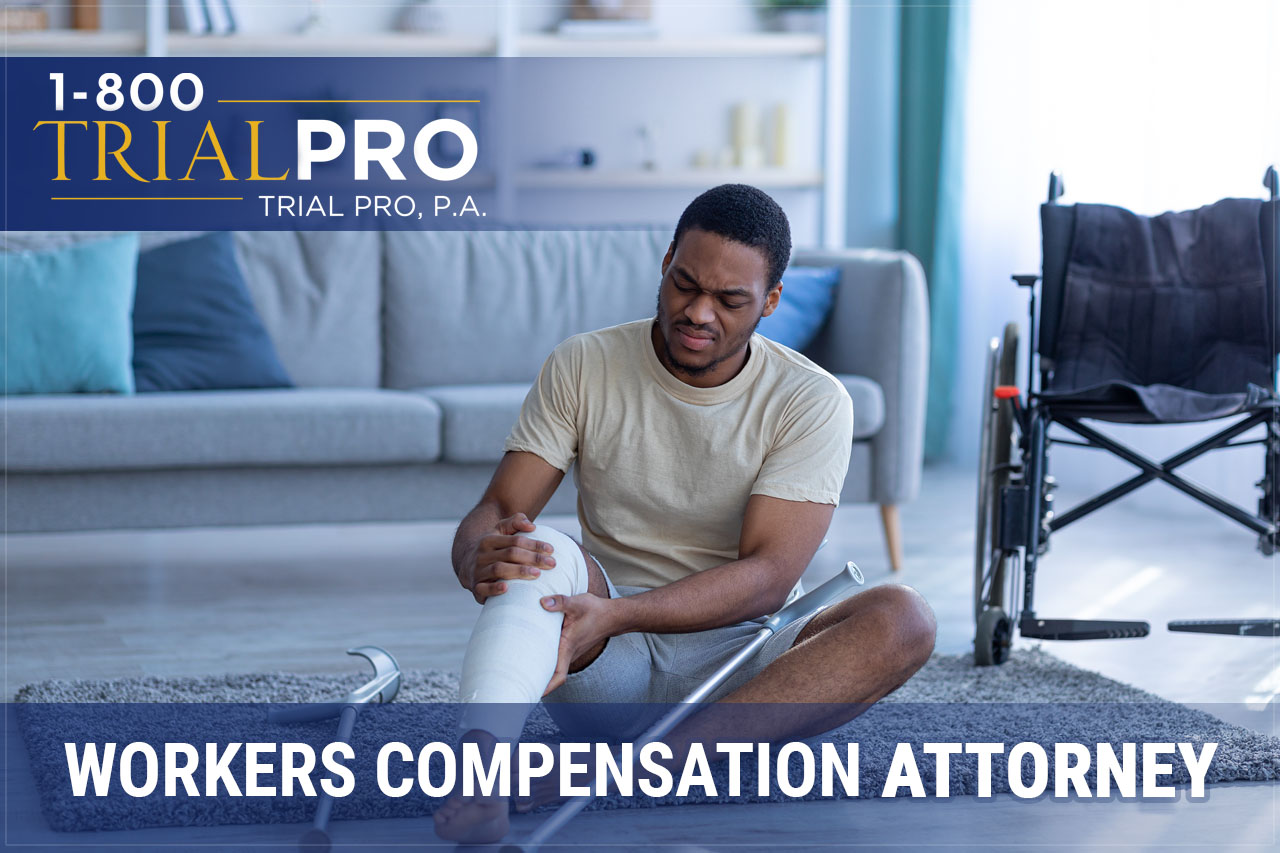
Florida law requires most employers to buy workers' compensation insurance coverage. Under Florida workers compensation laws, employees are compensated for occupationally sustained injuries, despite fault. This insurance coverage makes companies immune from some injury suits by workers.
Experienced Longwood Workers' Comp Lawyers Who Know How to Win Challenging Claims
Are you searching for a Work Comp Attorneys near you? If you are injured, we understand you may not be able to drop by our offices. Let us come to your place!
Trial Pro, P.A. works with Floridians in a range of personal injury law matters. Our practice areas include all forms of personal injuries; automobile collisions, motorcycle accidents, wrongful death lawsuits, slip-and-fall accidents, truck accidents, construction injuries and work comp accidents. With offices in Orlando, Tampa, Naples, Brevard County, Melbourne and Fort Myers. Trial Pro, P.A. delivers strategic advice and counsel to people in areas such as Altoona, Campbell, Paradise Heights, Pelican Bay, Coconut, Vanderbilt and across Florida. Get in touch with our office for a free of cost and confidential assessment of your case.
Worker's Comp in Longwood, FL is a legally required system of benefits that are accessible to most employees who are injured or hurt at work. It is a no-fault system, meaning that for the most part negligence in the cause of an injury is a non-issue. You could be entirely responsible or negligent in leading to an injury, also this does not disqualify people from getting benefits. In contrast your boss or colleague can possibly be negligent in leading to the injury, and this does not qualify you to even more benefits. is claimed as being equally a shield and a sword as for providing for benefits. It is a "sword" because your Workplace can not defend against your claim by saying you were negligent in causing the unfortunate incident. It is a "shield" that shields Workplaces from having to pay staff members many of the damages that are readily available to non-employees who are injured or hurt due to the accident.
Need to file a Workers' Comp Claim? Talk with our Expert Longwood, FL Work Comp Attorneys Call our office Now to schedule your free case evaluation - 800-874-2577
This scenario explains the "sword and shield" aspect of Work Comp. Let us's suppose Evan is a considerably careless baker. He barely cares about what he's working on. He's heading out the side door at work, hands packed with trash, to toss in the dumpster. As he races down the well-lighted stairs, he trips and collapses cracking his midfoot. His supervisor comes to his aid, and observes that Evan as is usual was transporting excessive amounts of trash to be safe and his shoe laces were actually undone. You might probably assume that Evan doesn't have a claim simply because his neglect induced the accident. But you would be not right.
Longwood companies and residential or commercial property owners are by law accountable for looking after their facilities and need to always keep it in a reasonably free from danger condition and warn occupants of any hazardous conditions of that they are conscious or need to be aware.
And now let's change the facts to some extent. Evan as opposed to being careless is tremendously careful. He always ties his no slip work shoes in double knots, never hurries down the staircases, and never ever transports a lot more than he can. Nevertheless his manager has been somewhat slack recently. The lamp on the stairs burned out, and he realizes that one of the steps is busted and is a tripping hazard. However he's too hectic to take care of that problem at the moment. As a result, Evan trips on the defective unlit stair that his manager knew about, however failed to even bother to inform Evan about. If you expect that Evan is able to now file a claim against his boss or Workplace for negligence as a result of his manager's careless actions, you will also be mistaken. Unmindful Evan possesses the exact same legal rights as a hurt worker as mindful Evan does. That may appear unreasonable, but that is a consequence of fault of negligence being a non-issue in work comp.
So let's examine who is entitled to these kinds of benefits in FL. First of all, you need to be an employee. Independent contractors (or 1099 professionals) are not qualified to workers' compensation benefits. As a rule, the company that you work with needs to be big enough to be required to bear worker's compensation benefits. Assuming that there are not at least four employees, then the Business isn't expected to offer workers' comp insurance coverage except if it is a construction job Also, presently there are a few jobs that usually are not covered in The Sunshine State under workers comp. Cases of occupations that are not covered are most real estate agents, owner-operators of semis, most volunteers, and taxi drivers.
Just let's suppose you qualify as an employee under the workers' comp system, does that mean that you're entitled to benefits if you sustain injuries or have an accident at work? Just like many legal questions, the answer is that it depends. First off, the calamity or trauma must "arise out of" and be "in the course and scope" of employment. Arising out of work in essence means that some aspect of the job caused the accident. A good example of a relatively frequent injury occurrence at work that is not frequently a job related accident is a heart attack or stroke. If you're sitting at your desk and you suffer a heart attack during the course of work hrs, this is not likely going to count as a worker comp accident. It may have happened at work, but the work did not inflict the heart attack. Even if you have a very demanding job and you're manager has been harassing you non-stop and you feature a stroke due partly to the other psychological toll work takes on you, this is not likely going to be covered. The cardiac arrest, stroke, or other "internal failures " are contemplated to be personal in character and unassociated to your job responsibilities. Consequently the fact that the event took place at work is not sufficient. Exceptions to these exemptions emerge if: (a) you are involved in an unusual strain or effort at the workplace, or (b) you are involved in a line of work where there is a anticipation that such activity is work-related - which include a police officer or fire fighter.
"In the course and scope of employment" is also required for an injury to be covered under workers' comp. In order to be in the course of employment, you definitely have to be at work. If you have a vehicle wreck either on your way to work or on your way home, the majority of instances those incidents are not going to be regarded as job related injuries. There are exceptions. To remain in the span of employment, you must be doing a task related to work or at the very least engaged in some sort of reasonable task the Employer could possibly have foreseen. If your job is to perform desk work in an office space but you injure or hurt yourself when you and your buddy choose to have a run down the staircase to see who's in the very best shape that injury is certainly not going to be considered work-related. You have foolishly drifted from your work duties to the point that what you're doing at the moment of trauma is no more sufficiently connected to work to be regarded as work-related.
Therefore, let's say you've cleared the hurdles of being a worker that's injured or hurt in the course and scope of your job by an injury that arose out of work, what do you receive? To remain entitled to lost wages, you have to miss a certain amount of work and the disability has to last a specific period of time. If you skip no more than a week or so from work, you're not going to receive lost wages. At the same time if you have an injury that heals within three weeks, you're not entitled to temporary benefits. If you do sustain an accident that keeps you out of work for a lengthy period of time, then you will receive compensation. Nevertheless, this remuneration is not your full income. Instead you obtain around two-thirds of what you were earning at the time of the accident. If the health care provider says no work at all, at that time you get 66.67% of what you were making at the time of the accident. If the health care provider claims you can work with restrictions AND the Employer is not able to accommodate those restrictions, you will obtain 64% of your earnings. But if your Boss is able to accommodate those restrictions and you are making 80% of your pre-injury earnings, you get no compensation. So bottom line is that if you are missing your job as a result of a work-related injury, you will lose wages. The longer your impairment, the more earnings you can forfeit. Unless you settle your case eventually, those lost wages are gone for good and will definitely not be recovered.
Therefore, let's say you've cleared the hurdles of being an employee that's injured in the course and scope of your job by an injury that arose out of work, what do you receive? To remain entitled to lost wages, you have to miss a particular amount of work and the incapacity has to last a certain period of time. If you miss no more than a week or so from your job, you're not going to collect lost earnings. Additionally if you have an injury that heals within just three weeks, you're not qualified to temporary benefits. If you do suffer a trauma that keeps you out of your job for an extended period of time, then you will get compensation. Having said that, this remuneration is not your full income. Rather you get about two-thirds of what you were making at the time of the injury. If the health professional says no work at all, at that point you receive 66.67% of what you were earning at the time of the accident. If the doctor says you can work with limitations AND the Company is not able to accommodate those limitations, you will obtain 64% of your wages. But if your employer is able to accommodate those limitations and you are making 80% of your pre-injury earnings, you get no compensation. So bottom line is that if you are missing work as a result of a work associated injury, you will lose wages. The longer your disability, the more paychecks you can forfeit. Unless you settle your case at some time, those lost paychecks are gone for good and will not be recovered.
A further constraint on your chance to obtain lost wages is that those benefits are only given for a particular period of time. As soon as you have attained maximum medical improvement, which is the doctors way of stating you're as good as you're going to get, you don't get anymore temporary benefits. Even if you have not gone back to work or your position is no more available, your temporary benefits end. If you receive an impairment rating caused by a permanent injury, you will receive permanent impairment benefits, although those benefits are less than the temporary and they are very short lived. They usually just last a matter of a few work-weeks or calendar months. Just very handful of injured employees, the most seriously injured, have a chance of being given long-term permanent benefits called permanent total disability.
If it pertains to medical care, your rights or benefits also have substantial constraints. If you have injuries that calls for urgent care, then you can get that care without first getting Company or workers' comp carrier authorization. Just after that early medical care, who you see for medical care is not your selection. Your Employer or more often its workers comp insurance company will likely inform you who you can treat with. If you don't like the medical professional they select, then you may receive a one time change but that's it. Moreover, you don't get to pick that next medical professional either. One more time the work comp insurance carrier picks the health care provider. You can get what is called an IME, or "independent medical doctor", but you have to pay for that health professional expense. Your health plan won't pay for it.
At least one of the few positive elements of the health care is that you do not pay for it period, other than a $10 copayment as soon as you reach maximum medical improvement. The insurance company is accountable for all other expenses of medical care including prescription drugs and physical therapy. Still as you can probably see by now, workers' compensation is not a fabulous system. It's also a complicated system.
If you find yourself in the work compensation system, you're better off obtaining advice and possibly a lawyer sooner rather than later. Mistakes made in the workers' compensation system may be very difficult or even impossible to unwind. Plus a number of errors can guarantee the end of your case completely. Therefore if you have a workers' compensation accident, talk to us promptly. The consultation is totally free, and you are under no commitment to retain us. In the case that you do retain us, you won't be out of pocket for any expenses or costs. Our firm only gets paid when we get benefits for you!
No Fee Unless Recovery
At Trial Pro, our personal injury lawyers work on a contingency fee basis. That means we cover the expenses of reviewing, building, negotiating and litigating your case. We do not charge you a thing unless our lawyers recover compensation on your behalf. If we do not win your claim, you will pay us nothing at all.
Our Longwood injury lawyers also provide absolutely free evaluations to assess the aspects of your insurance claim and establish if you have a lawsuit. Schedule a Free Examination
If you or somebody else you love has been impaired because of someone else's negligence or carelessness, you need a renowned lawyer on your side who is familiar with the statutes and regulations in FL.
Our Longwood injury lawyers are skilled in tort lawsuits and have been recognized by our peers for our accomplishments. A few of our legal professionals have been mentioned as Super Lawyers and distinguished litigators for their success in behalf of our clients.
We have recovered desirable judgments and settlements that contributed in assisting our clients recover from their personal injuries or the loss of a loved one. Let us help you recover the max amount of compensation you are entitled to for your traumas.
Acquiring Compensation for Your Workplace Injury in Orange County Florida
Because workers' compensation is a form of insurance policy, Florida workers compensation insurance typically covers what you would expect your vehicle insurance policy to encompass if you were hurt in an car crash. This workers compensation benefits consists of, yet might not be limited to:
- Medical Bills
- Lost Income
- Prescription Medications
- Clinical Equipment
- Earnings Replacement
- Particular Job Substitute Benefits
The nature as well as degree of your benefits rely on whether your injuries developed no disability, a partial disability, long-term disability or permanent disability.
Workers' Compensation Cases Frequently Asked Questions
- Can I Get Unemployment if I Get Hurt at Work?
- Can I Sue My Employer For Emotional Distress?
- Can The Internal Revenue Service (IRS) take a Workers Compensation settlement?
- Can You be Fired for Being Injured on the Job?
- Can You Sue Workers compensation for pain and suffering?
- Can You Work While on Workers Compensation?
- Do Workers' Compensation Insurance Companies Pay For Lost Wages?
- Do You Get a Settlement from Workers Compensation?
- How Long Do You Have To Report an Injury at Work in Florida?
- What are Common Industrial Accidents and Serious Occupational Injuries
- What Is the Statute Of Limitations On Workers Compensation Claims?
- What is Workers’ Compensation and what does it cover?
- When can you File a Personal Injury Case instead of Worker's Comp?
- 10 Steps To Take After a Work Accident in Florida
